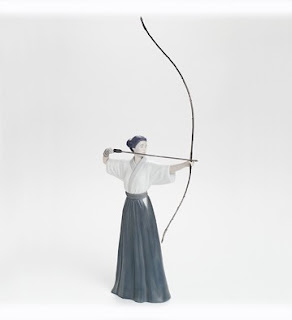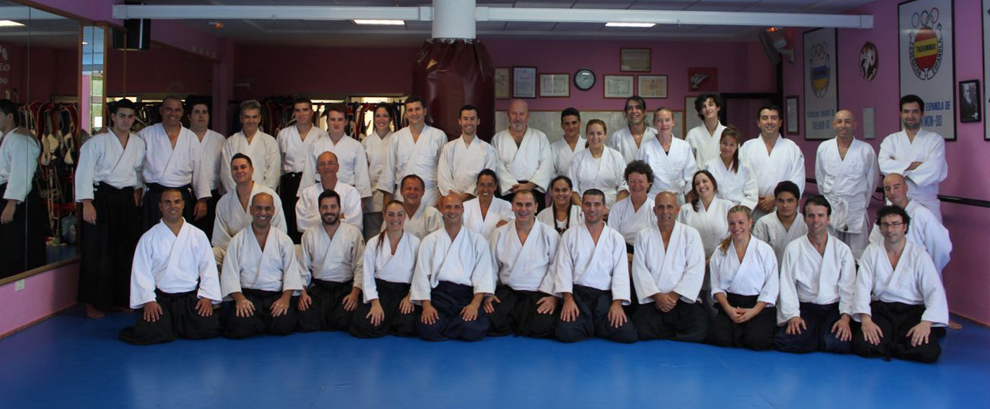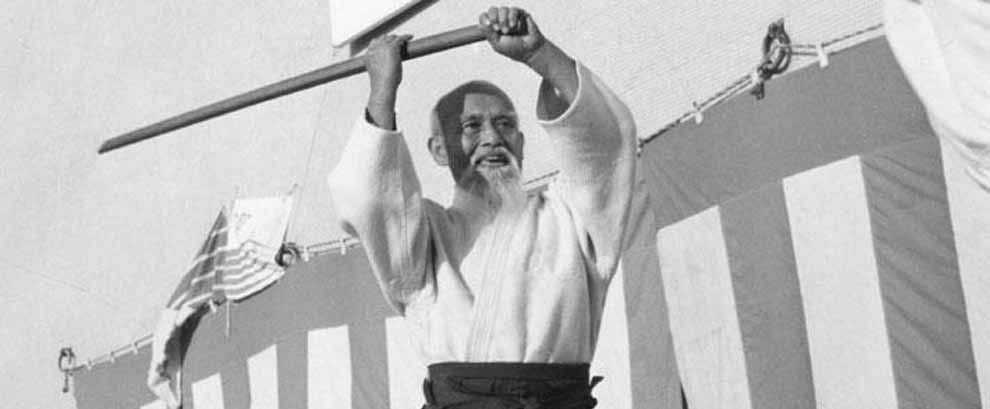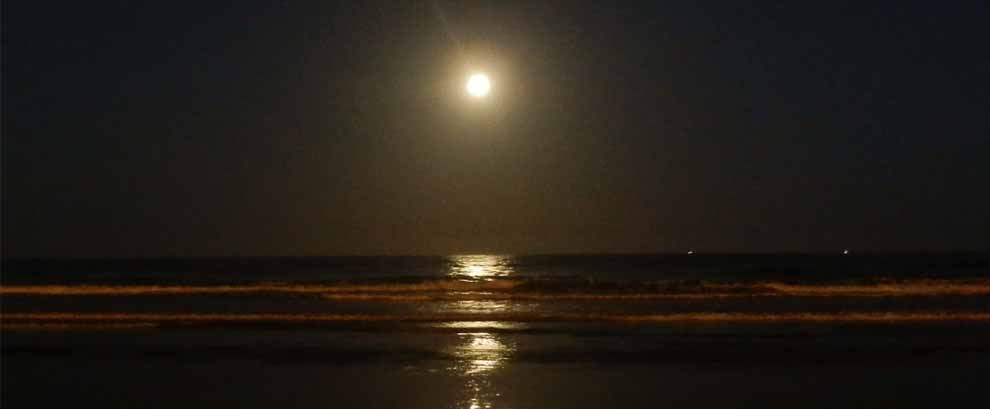 Ancient Japan is reported by a prince, der Kyudo, the Art of Archery, wanted to master. That's why he was looking for the man on, of which the rumor, that he was the most outstanding masters of archery by all. The Master was a modest, a little getting on in years, Mann. They went for a walk on the lawn behind the simple abode, when the prince cautiously inquired about the skill of the master. Just as she passed away so in calm step, came a croaking bird flying high above them zoom. Immediately the Master had the bow in his hand and shot an arrow – without seeing even in the direction of the bird. It was as fast as a thought. The arrow hit the bird in the middle of the chest, and this plopped down on the hill. The prince was delighted. Never before has he had such a grace, seen such speed and accuracy with the bow. “You must be my teacher!”, sagte er. But the Master shook his head.”Can not I, I myself am just a beginner, teach someone to Kyodo.” As much as the prince also asked, Master did not give up. Instead, he said. “Come back in ten years – maybe I'm there then
Ancient Japan is reported by a prince, der Kyudo, the Art of Archery, wanted to master. That's why he was looking for the man on, of which the rumor, that he was the most outstanding masters of archery by all. The Master was a modest, a little getting on in years, Mann. They went for a walk on the lawn behind the simple abode, when the prince cautiously inquired about the skill of the master. Just as she passed away so in calm step, came a croaking bird flying high above them zoom. Immediately the Master had the bow in his hand and shot an arrow – without seeing even in the direction of the bird. It was as fast as a thought. The arrow hit the bird in the middle of the chest, and this plopped down on the hill. The prince was delighted. Never before has he had such a grace, seen such speed and accuracy with the bow. “You must be my teacher!”, sagte er. But the Master shook his head.”Can not I, I myself am just a beginner, teach someone to Kyodo.” As much as the prince also asked, Master did not give up. Instead, he said. “Come back in ten years – maybe I'm there then
value, to be your teacher.” This communication from the prince had to settle,
and he returned to his farm. But he did not forget the master and its overwhelming demonstration. Were a decade passed, he went to see him again. This time, they went for a walk in the meadow and the prince was full of the question, as the Master may have in his art developed well. Soon, a bird came cawing over the sky. The Master did not even look in his direction, stressed only the string of the bow – without putting an arrow on it – and let go. The bird jumped, as struck by an arrow, and fell on the hill. The prince did not know what words he could find for his admiration, and declared, that the master must now accommodate students.
“No, nein”, said the master. “I'm still not more than a beginner.”How forcefully the prince also asked, he had to settle with a new ten-year period. “Maybe I'm worthy of it then”, said the master. Und die Jahre vergingen. Nun geschah es so, dass das Reich nach einigen Jahren Unruhen einen neuen Herrscher bekam, und der alte Fürst von seinem Thron gestoßen wurde. Er kam mit dem Leben davon, aber er verlor all seine Macht und sein Eigentum. Er bewegte sich auf den Straßen inmitten seiner früheren Untertanen und lebte in Armut. Als er eines Tages auf den Straßen der Stadt herumging, erblickte er eine große Menschenansammlung. Viele Menschen drängten sich um einen alten Mann, so konnte er sehen, und sie hörten andächtig auf das, was der Alte zu sagen hatte. Als es dem Fürsten gelungen war, sich durch die Menge nach vorne zu drängen, erkannte er in dem alten Mann den Meister des Bogenschießens wieder, und er grüßte ihn mit großer Freude. “Master”, he said humbly, “how far you have come with your art in all these years? What miracle ye can now with your bow and arrow?” The master looked at him with a puzzled expression and asked: “What's Arrow? What's Arch?” In Japanese martial arts, it is a well-known wisdom, that you have to throw his progress by itself, to arrive at new. Whoever succeeds, to bring into existence something big again, and then can not let them, it can not be forgotten, in which there is no space for new. Das
Can be so easily a prison, where the vanity is a more careful guard. When one has arrived at a skill, which is so great, that you can feel on them pride,
so it will be hard to move on. The skill is an asset, so alluring and as seductive as gold. If one clings to any skill, so you will quickly so heavily loaded,
that his legs give way and bring about a single step more. One speaks in Japan of the full tea cup. One can the, who has his cup already filled to the brim, einschenken no further drops. So much one also pours, it just flows over. Anyone who wants to record something, must empty first, who wants to learn something, Forgot must first. We usually provide ago, dass der, which empties his mind constantly, never expanded his knowledge and always stupid and ignorant remains. Rather strive after many, your vessel
to expand, so that it can accommodate more. But the vessel has to be given volume, and there is an absolute limit for the, which can absorb it. Since one needs to venture there, throwing his knowledge of himself, to learn something new. The fear, to do, is rooted in the ignorance of the difference between skill and understanding. Names of things, mass and weight, Timings, all require space in our heads, so that it remains with us. Similarly, it takes time in the form of practice and repetition, so it does not escaped us, despite everything. But understanding does not occupy space. What you have understood once can not escape a, and it takes but a head no place in.
The knowledge itself is something dead and petrified. If knowledge leads to understanding, it learns of life and meaning. It is also at this moment, that knowledge has been served and the same may well wither – as it naturally will.In mathematics, a science with many, despite their advanced age unchanged insights, can not be regarded as solved task, before the correctness of the solution was proved. It is not enough, that the student points to a formula in the formulary and believes, that they must be properly, because it stands – he must prove they can themselves. Deshalb
mathematics is a vital and fresh science, although it is perhaps the most ancient. Each new mathematician can all of their theses and Schlussätze up all the way back
pursue to its logical foundation, the otherwise as the logical foundation of man. Since mathematics can be traced back to their origin, can she
also, whenever, by whom it is exercised, be recreated from scratch. Who has fear, Throwing knowledge of itself? Knowledge like a conversation an interesting, give impressive impact, but by its nature it is a burden.
It is a heavy burden, the throwing of itself, once you reach the end of the journey. Knowledge is only the fuel, the raw material, which should lead to understanding. When reached
is, there is no reason, hold on to knowledge. In fact, it may – even if it fills the shell not quite up to the edge – be an obstacle. I went to the elementary, when we started quite cautiously, to become familiar with the chemistry. We solved sugar pieces in cold and then in warm water on, and other simple things. Our teacher explained the processes on the makeshift way, we were able to understand. When we finally arrived in the Intermediate, declared our chemistry teacher in his first meeting with us:
“Forget everything, what you have learned in the basic level!”We were starting from scratch, the periodic system, with atoms and molecules, and how it all means. To
Secondary school we memorize some, and there we were greeted by the new chemistry teacher with the words: “Forget everything, what you have learned in junior high school!”
We were able to completely start from scratch again. I felt then not so inclined, Try chemistry at the university. In each section, we had learned chemistry by means of simplifications – to lead us the complicated science benefit. We needed these simplifications, to moving gradually towards a more comprehensive understanding of chemistry, do that the more advanced theories for us intelligible
should. Sure it would have gone faster, to plunge directly onto the outermost insights and recent achievements of chemistry, if that had been possible for us. But that was
not. The simplifications served us as comprehensible stages, but if we had held on previous knowledge, so our understanding would never have even a decimeter
recessed. It was necessary, to throw this from us. Although the knowledge on its way, in phase, richtig war, It was from the perspective of the new phase is nothing but a fake. So also works Aikido, if not always as clearly. Who can not take the skill of previous phases of itself, tried higher insights on
wrong reason to build. This goes nicht.Man should always aim in his learning process on the understanding and the knowledge seep, if it seeks to naturally thereafter. Why his boggles as the upper arms when Faust Press, instead to relax and let the knowledge affect benefits, until it flies by itself?
You have to trust, that the brain will keep the essentials. It retains the formula and raises the example of itself. In Aikido the novice learns, completely vigilant for his body, All small details of the art. These are refined through constant repetition in training, the slightest mistake will be improved. In all of these trouble with the little perspective of beginners often which is unconscious, was im
happened big picture. While he practices the same old basic techniques one again and again, makes his body and his senses more and more naturally and irrefutably
appropriated the real reasons of Aikido. Die Haltung, the breathing, the flow of energy and the erweitete mindfulness – all that comes imperceptibly through the training to him and
is a natural part of his nature. And that is the essence of Aikido. His movements get a center and a river, his senses are open and clear – while his brain with all of these basic techniques employed ist.Deshalb he must, if he has been familiar in its essence with the essence of all techniques, throw them voluntarily. Are
must they forget, because they are now in him. If he needs a Aikido technique, he can re-create it immediately. In modern scientific terms, we can say
that his Aikido by conscious thought, somewhere in the convolutions, shifted in the reflexes of the medulla oblongata in. The movements do not claim
Awareness more, they go by Reflex. The relaxed spirit acts instantaneously in a situation, to ensure an appropriate manner. Man throws away his knowledge and trusts, that one's interior and your own body to know what should be done, and that they'll do it right. Since you have an actual Can erreicht.Das is the way of Aikido to understand, and it applies to all Budoarten. Only those who dare to forget will learn, and ever
more one dares to leave behind, the more you will find.
By Stefan Stenudd
From: Aikido – The peaceful martial arts
Throwing himself
Get behind an answer
Du musst sein Eingelogged um einen Kommentar zu hinterlassen.









Latest Comments